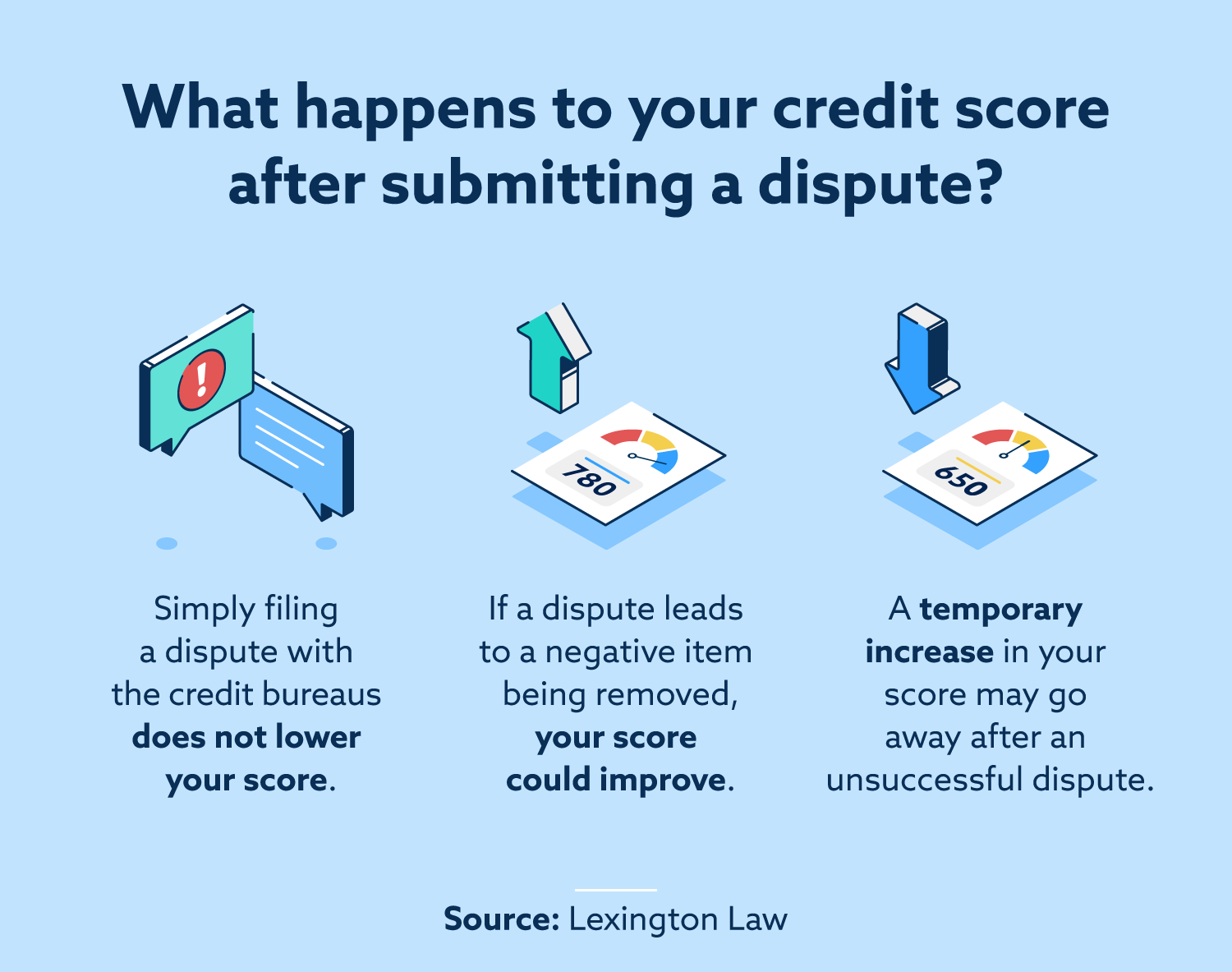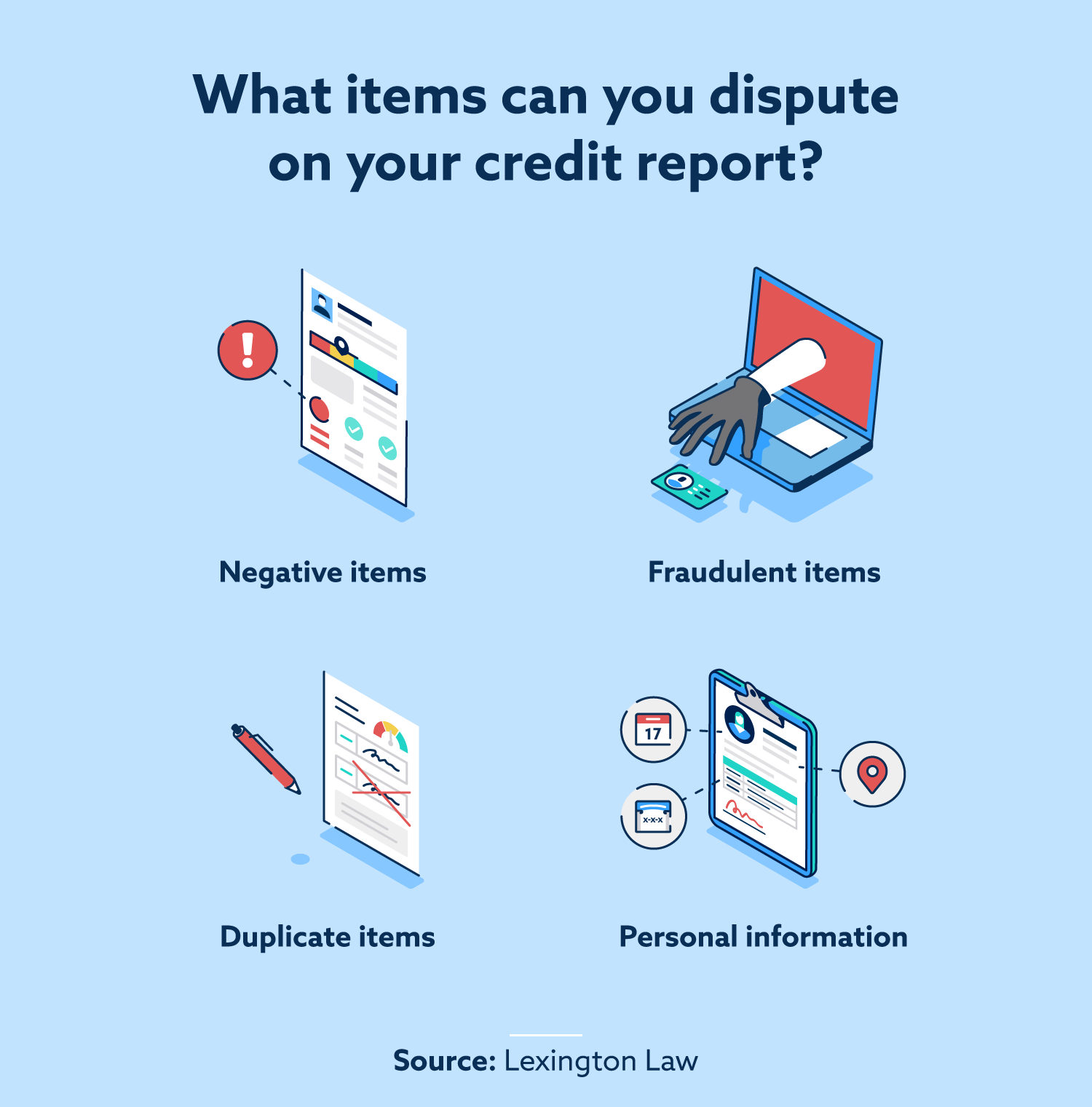
The information provided on this website does not, and is not intended to, act as legal, financial or credit advice. See Lexington Law’s editorial disclosure for more information.
Filing a credit dispute does not directly affect your credit score, but the results of the dispute could raise or lower your score.
Filing a credit dispute does not directly affect your credit score, but the results of the dispute could raise or lower your score. After the dispute is filed with one of the credit bureaus, they will investigate to see if the dispute is valid. If your dispute leads to a negative item being removed from your credit report, your score is likely to improve.
In general, filing a dispute is a good idea if you believe that a negative item on your credit report is inaccurate. Since the dispute itself will not lower your credit score, you’re likely to be no worse off after initiating the dispute—and if you’re successful, your score could improve.
Read on to learn how disputing items on your credit report affects your credit score, as well as answers to other common questions about disputing your credit report.
What happens to your credit score after submitting a dispute?
After you submit a credit dispute to one of the three credit bureaus, they’ll investigate your claim by contacting the original creditor. Ultimately, the credit bureau will decide whether there is sufficient evidence to back up the item on your credit report and share the results with you.
Starting a dispute does not lower your credit score on its own, but the outcome of the dispute can either raise or lower your score.

Let’s take a closer look at how the dispute process can affect your credit score.
- Simply filing a dispute does not lower your score. The credit bureaus—TransUnion®, Experian® and Equifax®—encourage you to dispute inaccurate information on your report, so they will not lower your score for doing so.
- A successful dispute could raise your score. If your dispute leads to the removal of a negative item—like a late payment or a repossession—your score is likely to improve, since the negative item will no longer be factored into your score.
- A temporary increase in your score may go away after an unsuccessful dispute. Oftentimes, items that are being disputed are ignored when determining your credit score. As a result, you may see a temporary increase in your score during a dispute. If the item is proven to be valid, that temporary increase is likely to disappear.
If you have evidence that a negative item on your credit report is inaccurate, submitting a dispute is generally a good strategy with few downsides. Since you want to present the best evidence when submitting a dispute, many people choose to work with credit repair professionals to get inaccurate information removed.
If you’re considering filing a dispute, there are a few other common questions to keep in mind.
How do you submit a credit dispute?
Submitting a credit dispute is a straightforward process that is similar at all three credit bureaus.
Follow these steps when you’re ready to submit a dispute:
- Collect evidence. Make sure you have supporting documents as evidence that the negative item is inaccurate.
- Send a letter via certified mail. You can file a dispute with one or more credit bureaus—and you should dispute at multiple bureaus if the inaccurate information is on multiple reports.
- Wait for a response. The credit bureau has 30 days to investigate after they receive your dispute, and they’ll report the results to you within five days after concluding their investigation.
- Review your results. You’ll receive a letter detailing the results of the investigation, including whether the negative item was removed from your report. Afterward, you can see how your credit score was affected—but it may take time to show its full effect.
For more details, follow our guide to initiating a credit dispute to understand every step of the process.
Why does your score sometimes change during a dispute?
During a credit dispute, your score may increase due to a negative item being temporarily ignored. Normally, when your score is calculated, a negative item results in a decreased credit score. However, items that are in an active dispute may not factor into your credit score.
While you are disputing your credit report, an “XB” code is filed alongside the items you are disputing. This code informs lenders and other agencies that view your report to temporarily ignore the item while it is being reviewed.
This helps to explain various score changes during and after a credit report dispute. If your dispute is unsuccessful, your score may appear to drop—but it may actually just revert to where it was before the XB code was placed. If your dispute is successful, your score may not increase as much as you had hoped if the negative item was already being ignored as your score was calculated during the dispute.
In any case, it’s generally useful to dispute any inaccurate information, so it’s helpful to know exactly what information you can dispute.
What items can you dispute on your credit report?
You can initiate a credit dispute about nearly every aspect of your credit report.

Here is a summary of some of the information you can dispute:
- Negative items. Also known as derogatory marks, these items lower your credit score—but they may be inaccurate or past the statute of limitations.
- Fraudulent items. Fraudulent items—like accounts opened after identity theft—may show up on your credit report.
- Duplicate items. Sometimes an account appears multiple times on your credit report, especially if you have an account in collections.
- Personal information. There may be errors with your name, address, birth date or Social Security number.
Inaccurate information can harm your score, so you’ll want to be proactive in filing a dispute if you notice something amiss in your report.
What can you do if your dispute is unsuccessful?
After you receive the results of your credit dispute, you may find that the credit bureau has determined there wasn’t enough evidence to support your dispute.
If you nonetheless suspect that your credit report contains inaccurate information, you have several options:
- File another dispute. If you have new supporting documents or additional evidence, you can file another dispute with the credit bureaus. However, you should not file again without new evidence, as your dispute will likely be dismissed.
- Provide a statement of dispute to the credit bureau. You can attach a statement of dispute to your credit report, which will be available to any creditor who accesses it. This statement outlines your evidence that a particular item is inaccurate.
- Contact your creditor directly. You may be able to have a negative item removed by working directly with the creditor who reported it to the credit bureaus.
Filing a dispute is straightforward, but working with experienced professionals can be helpful. If you’ve found inaccurate information on your report, the credit repair consultants at Lexington Law Firm are available to assist you in filing a dispute with the bureaus.
Note: Articles have only been reviewed by the indicated attorney, not written by them. The information provided on this website does not, and is not intended to, act as legal, financial or credit advice; instead, it is for general informational purposes only. Use of, and access to, this website or any of the links or resources contained within the site do not create an attorney-client or fiduciary relationship between the reader, user, or browser and website owner, authors, reviewers, contributors, contributing firms, or their respective agents or employers.
